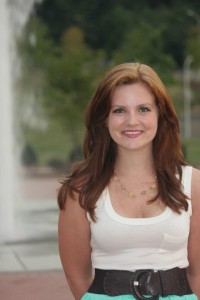
Being a first-generation college student didn't stop Alecia Page from setting high goals. Photo by Morgan Carver Photography.
Alecia Page spent her entire college career holding many titles at Western Carolina University. When she walked at the graduation ceremony on May 11, she left behind a legacy – a program that will provide assistance and support for first-generation college students.
“I was elected freshman year into senate, so my term started sophomore year as sophomore senator,” Page said.
Page went on to become vice president of WCU’s student body as a junior and moved up to student body president in her senior year. She also served as a delegate for the UNC Association of Student Government for two years, while also being a sister of the Alpha Chi Omega sorority at WCU.
First and foremost, though, Page was a full-time college student, and a first-generation college student at that.
While Page spent most of her college years listening to the vices of WCU’s students and fighting to make WCU a better institution, she still had to jump over the hurdles of being a first-generation college student and take on the obstacles that came along with it.
Page became passionate about helping other first-generation college students during her time in SGA. She is in the process of crating a program designed to assist first-generation college students through the entire process of obtaining a college degree.
“The general idea for the First Generation College Students (FGCS) learning community is to, first, put them in a residential area together,” Page said.
Page’s idea for a residential learning family would allow students of the same background to create a support system with each other.
“I really struggled with that my first year,” Page said, “and I can’t help but think my time here would have been easier if I had found people who had similar backgrounds sooner.”
FGCS would also have a seminar, similar to freshman and senior seminars, which would assist first-generation college students in picking classes and majors, finding and applying for scholarships, and finding places to work on campus. The seminar would also offer “one-on-one advising for choosing classes, applying for internships and career planning,” Page explained.
Page recalls her first experience registering for classes:
When Page first registered for classes in her freshman year, she ended up taking 19 credit hours of liberal studies courses, including some honors-level classes, not realizing what a daunting workload she was taking on all at once.
“I survived but it took a lot out of me,” Page said. “I don’t think I learned as much as I could have if I had taken a normal load.”
Page hopes that FGCS will help first-generation college students get all of the information they need when it comes to registering for classes and joining clubs. She wants to smooth out the process for first-generation college students so they don’t have to struggle and learn everything on their own like she did.
Hear Page discuss her time in SGA and her thoughts about being a first-generation college student.



